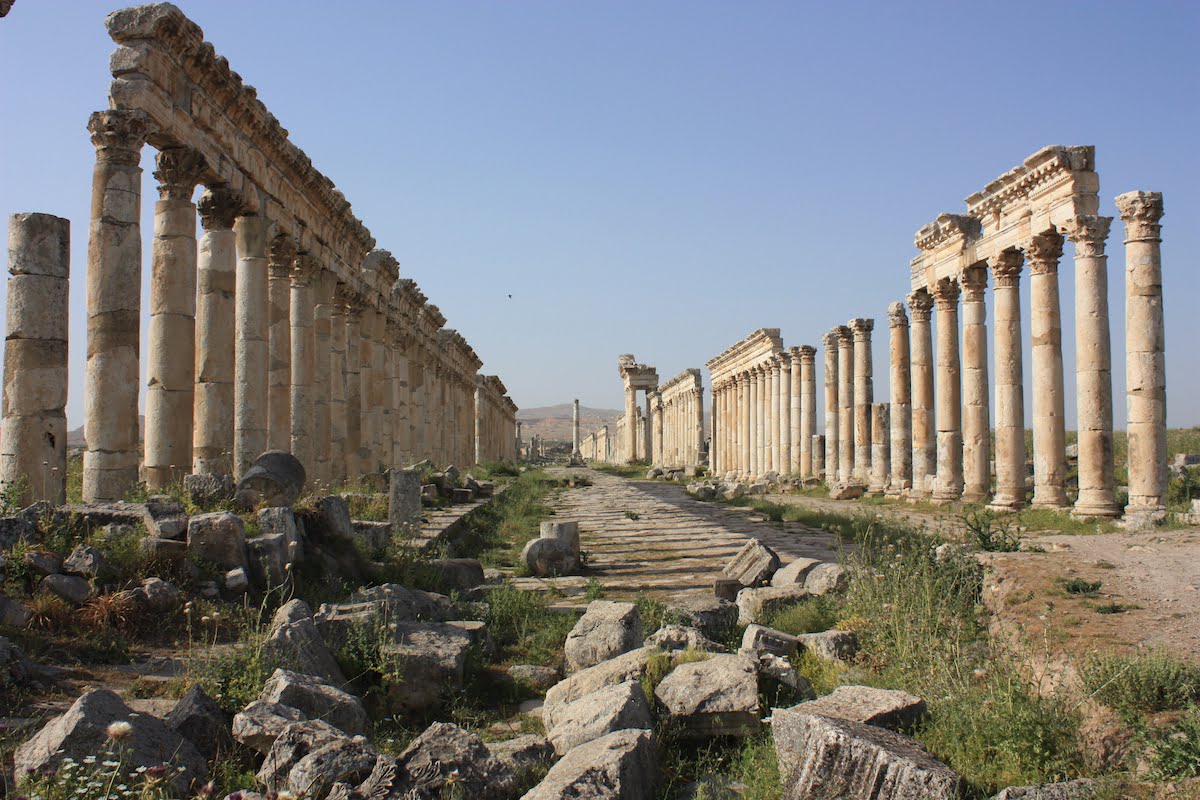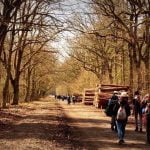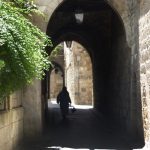As we drove from Hama, westwards into the countryside, I looked out and embraced the surroundings. I have always loved the Syrian countryside. It has a distinct soul, so serene and timeless that I sometimes wondered how it could co-exist with the neighbouring villages.
The olive trees were lined up so neatly next to each other, almost exactly the same height and form, on wavy hills. The pistachio trees also looked alike and it took me some time to distinguish between them.
The aura of the countryside groves bore little resemblance to the neighboring villages, where unruly buildings were scattered. Some buildings looked deserted; others were overly packed with people. For some reason there were always plenty of unpainted and unfinished concrete structures. Then there were the banners advertising the new fried chicken “broasted” joints that popped out everywhere in Syria and that almost all shared the same slogan: “We are not the only ones, but we are definitely the best.” These chaotic scenes would slowly dissipate the farther you moved into the countryside, where the land was emptier yet overwhelming in its simple splendour.
My best friend Bisher and I used to love to go on road trips on the weekends from Damascus. Syria was a big country; yet not big enough to travel without a car. It was small, but not small enough to tour too conveniently. It needed planning and very few people around me were interested in discovering different parts of Syria. But Bisher was, and on that particular weekend in the early spring days of 2007 we headed towards Apamea, located a few kilometres away from the central city of Hama.
Around thirty minutes after leaving Hama, and after following the signs and having a small laugh about the five different ways the name “Apamea” was spelt in English on all the signs, we finally reached the historic site. Its magnificence stemmed from being so surreally out of place. It was one of the largest colonnades I have ever seen. Even in Rome itself, I did not recall having seen such a splendid structure. We parked in a dirt road nearby, and noted the presence of more tour guides than tourists. We paid the deeply discounted fee designated for Syrians, created in an effort to encourage locals to visit their own historical ruins and walked in. We were the only Syrian tourists that day.
“You know this tower was built by the great…” came an unsolicited yell by one of the tour operators, forcing us to listen to his “insightful” story behind the colonnade. We politely looked away, expressed disinterest and walked along.
The structure was incredibly grand. Two parallel series of high rising columns lined up perfectly. We took some photos and walked around, until someone carrying a black plastic bag came nearby and hissed to us.
“I have some ancient Byzantine and Roman coins. Want to take a look? I’ll give you a great price.”
Bisher and I knew these were fake, but still we were intrigued. The seller showed me three dark coins. The moment I saw one of them, I knew I had to buy it. It showed a bust of what looked like a Roman emperor or ruler, with some Roman letters and then centered by the word L. Romani. The resemblance to my own name, Louai Roumani, was unbelievable. Finding a coin in Syria that (almost) bore my name was something I needed to have. The fact that it was not genuinely ancient appealed more to me actually. The seller, like any other good Syrian trader, had sensed the spark in my eyes. This put him in a stronger bargaining position. I paid the equivalent of around ten dollars and walked happily with my coin. I probably could have bought it for three dollars, but I was still very happy with my purchase.
Bisher wanted something for himself as well, so he asked the seller to show him what he had. The seller lit up a cigarette and just as he was taking out a coin, he noticed someone scurry down the colonnade. He quickly threw away his cigarette, packed his bag and made his escape though the ancient colonnade, before jumping to one side and running down the nearby valley until we could no longer see him. We looked behind us and saw a heavily mustached gentleman with an inverted badge on his shirt. We could not tell who he was but he was someone of civic authority. Out of all formal authorities in Syria, everyone knew that such persons with civic authorities commanded the least authority in the country.
“Excuse me, gentlemen, but what was that guy selling you? Did he lure you into buying one of his con coins?”
“Yes, but it’s OK,” I said.
“I am from the Ministry of Tourism. These sellers are unbelievable; they forge coins and trick people to think they are real ones and make a living out of it. Can you believe it? And even if they had found real coins; how can he sell them? These are treasures that belong in the museums. These are Syria’s treasures!”
“Yes they are, and you should control this better; these people are giving Syria a bad name. We are locals so it’s fine, but imagine what tourists would think if they encountered such a person,” replied Bisher.
The Ministry employee seemed a little uneasy. “Gentlemen, are you journalists by any chance?” he asked.
We clicked our tongues in a quintessential Middle Eastern Style – an emphatic no. We followed it with “of course not”, akeed laa. He seemed immensely relieved.
“You know, we don’t want journalists coming here from Damascus and giving us a bad name. We work very hard to keep this famous structure intact and in great shape. Glad to see you seem to be enjoying your time.”
We thanked him, bid him farewell and just as we turned around to continue our tour, we heard him talk to us, this time in a slightly different tone:
“Gentlemen; if you are looking for REAL Roman coins, then look no further than here.” He reached into his pockets and showed us three coins. Unlike the ones we saw earlier, these looked genuinely ancient.
Apamea by Arian Zwegers / CC by 2.0
Apamea, Shepherd by Arian Zwegers / CC by 2.0



